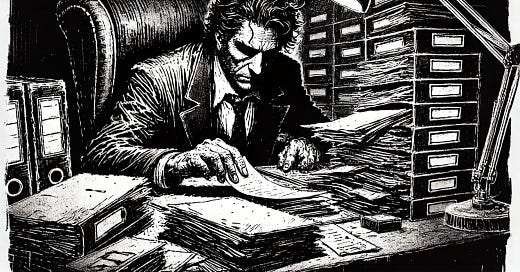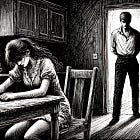Cardona enters the room. The desks are empty, the window closed, and the neon lights are on. The light coming in is so dim it seems the sun has already set. He moves toward his desk, searching through the scattered papers.
- Cesarano! - he shouts.
He brushes aside the countless documents cluttering the surface, grabbing a few, but they seem to multiply, never revealing the gray laminate beneath.
- Commissioner, you’re back?
- Cesarà, why does it feel like no one ever works in this room?
- Commissioner, they just went out.
- They’re always out, aren’t they, Cesarà?
- Commissioner, what do you want me to say? When De Michele doesn’t see you, I say the same thing, but we’ve got to help each other out, right? How else do we get by?
- You’ve got a point. - He stops, walks around the desk, and sits down. - Have you seen my planner?
- Commissioner, you ask too much.
The commissioner opens the first drawer, then the second, pulling out a pack of cards.
- But, Commissioner, I do have good news.
- Eh, Cesarà, you’re going to make me a happy man today.
- Commissioner, I’m not joking. Look what I got for you at the hospital.
He waves an brown envelope, sealed and stamped.
The commissioner stops and looks up. He fixes his gaze on the envelope, then at the officer’s face. Cesarano is smiling as he shakes the piece of paper.
- Good job, Cesarano, - the commissioner says, satisfied. - the autopsy was exactly the second thing I was looking for.
- Thank you, Commissioner. - Cesarano’s face beams with pride as he gently places the report on the desk.
The commissioner picks up the envelope, reaches into his pocket, pulls out his house keys, and grabs the longest one. He slips it under the glued flap and begins to open it.
- Now, you need to do one more thing for me.
- Just tell me, Commissioner.
- I need you to pull everything you can find on the Solimena family—Michele, Umberto, and Marzio. Everything. Criminal records, residence, properties, university, all of it. And I need it faster than this autopsy. Oh, and Cardia, Augusto. He worked at Prosud. See what you can dig up.
- My dear soul! You want to bury me! How can I do all that? I’ll need a month! - Cesarano throws himself back in his chair, arms spread wide.
- Cesarà, you know what the Americans say?
- Oh, here we go! The Americans! You always bring those people up!
- The Americans say eighty percent of crimes are solved in the first...
- In the first fifteen days - Cesarano finishes.
- Twelve, Cesarà. Twelve days after the event.
- Oh, now it’s twelve.
- And that’s not all. Bring me everything you can find on Prosud too—articles of incorporation, shareholder meetings, and everything else from the founding to today.
- My goodness!
- Go, Cesarano, let the wings of justice fly! - the commissioner exclaims with amusement.
The uniformed officer shakes his head and walks away, muttering something, hands on his hips.
- Cesarano. - The commissioner’s voice is serious.
Cesarano turns back, and the smile is gone from Cardona’s face.
- Cesarà, don’t leave me now. There’s something I need to understand. - The man looks at him from near the door.
- Commissioner, he killed himself. A rich, spoiled kid who fell into depression.
- I wish it were that simple. If it is, I promise you I’ll buy you a pizza. But until I can confirm it, you need to stay close.
Cesarano turns and leaves the room without saying anything.
The commissioner pulls the document from the envelope. Dr. Cerchia Luigi.
- Cerchia, Cerchia, you were quick this time. Who lit a fire under you?
The first page says nothing—date, day, place, blah blah blah.
“Autopsy”. Let’s see.
The autopsy was performed on the morning of Friday, September 8th, at 8:00 AM. The body is identified as Marzio Solimena, confirmed by dental records provided by the deceased’s dentist. Both the maxillary and mandibular arches match. The body is completely carbonized and frozen in the boxer’s pose, with arms hyperflexed toward the chest and knees bent and drawn up to the abdomen. This suggests the person burned while collapsed on the ground. The muscles appear contracted and retracted. The skin is mottled with leopard spots, alternating between different degrees of lesions. The internal organs are visible from the outside. The mouth is half-open, with teeth fully exposed. All bodily fluids are evaporated or coagulated, indicating prolonged exposure to flames. In some areas, the tissues have fused with the body. The bone structure remains intact except for a cranial fracture.
The commissioner grumbles as he reads the last sentence, leaning forward over the paper.
However, it should be noted that this fracture does not appear to be caused by an impact with a blunt object but by overpressure from gases generated in the cranial cavity due to heat.
Analysis of the deep airways reveals soot accumulation in the main bronchial trunk, indicating respiratory activity during the fire. Bronchial and pulmonary edema are also present.
The heart has the consistency of boiled meat. A blood sample was taken from inside, and analysis shows a carboxyhemoglobin level of around 10%. This further suggests respiratory activity during the fire. It is reasonably assumed that the victim was alive but unconscious during the carbonization process.
The report continues with detailed descriptions of the internal organs—nothing too interesting.
The commissioner leans back in his chair, letting the papers fall from his hands. He was alive while he burned.
Cardona presses his lips together until they disappear, squinting. Then he suddenly lunges forward, reaching across the right side of the desk, pushing aside some folders, and grabbing a blue folder. He opens it, discards the first few sheets, grabs a thick stack, lifts it, and nods in satisfaction as he flips through it. He stops at a document, the cover labeled “Interrogation Transcript.”
- There it is.
Antonio Lupi, employee of the Vigilanza e Protezione security company, stationed at Prosud S.p.A. as a night guard during the shift from 10:00 PM to 6:00 AM.
The commissioner delves into the report. Lupi was alone during his shift, and when asked why, he explained that his colleague, Francesco Acanfora, had felt unwell—nausea, diarrhea, and feverish chills. Acanfora called to be replaced and left, saying he hadn’t felt well when he arrived at work. After half an hour, he called in to ask if he could go home. He took his car and left. Lupi remained alone from 10:30 PM. At that time, the plants were idle, as production wasn’t running across three shifts, so the entire facility was shut down. He didn’t notice anything strange or suspicious, and the night passed quietly until 12:15 AM, when a bright flash caught his attention. He turned and saw building 3, the one housing the engineering and administrative offices, engulfed in flames. The windows had exploded, and the flames were pouring out. He raised the fire alarm and called the fire department.
They asked him if anyone had entered the facility. He said that since he started his shift, he hadn’t seen anyone enter.
The fire department arrived at 12:45 AM, but by that time, the fire had already consumed the entire building.
There’s nothing else of relevance. The commissioner sets the paper down and takes out his notebook, writing, “talk to afternoon shift guard.” He pauses with the pen in hand, then adds, “badge entry list.”
He puts the notebook back in his pocket, picks up the phone, then takes out his cell phone. Flipping through his contacts, he dials the landline while reading from the screen.
The phone rings.
- Hello?
- Vincenzo, hey, it’s Cardona.
- Commissioner! How are you?
- Doing well, Vincé. Am I bothering you?
- Of course not, don’t worry. What’s going on?
- Everything good at the department?
- Not bad, we’re getting by.
- Listen, Vincé, I’m doing some research on the incident at Prosud. You know the one, right?
- Of course. What do you need?
- I’ve been thinking because I read that the security guard noticed the fire at 12:15 AM and said the flames were already coming out of the windows, which had exploded.
- Uh-huh, and?
- So, I wanted to ask you, based on your experience, how long does it take for windows to explode from fire?
- That depends, Commissioner. It depends on the fire-resistance class.
- They were offices. What class do you think they had?
- Off the top of my head, I’d say that unless they were archives, the offices probably weren’t classified. So, I’d guess they were regular windows, maybe double-paned for thermal insulation.
- And how long would it take for those to break?
- Commissioner, please take what I’m about to say with a grain of salt. Without knowing the specifics, I’m just throwing numbers out there.
- Don’t worry, Vincenzo. I just need an idea of what we’re talking about.
- Okay, well, let’s say they were offices, so the fire load would mainly come from paper and scattered documents, which are easy to ignite and produce a lot of flames, meaning heat. Under those conditions, an untempered window would shatter about… let’s say five minutes after the flash point.
- And what’s the flash point?
- It’s the point at which there’s enough heat in the room to ignite all combustible materials at once. Basically, a small flame starts, grows bigger and hotter, and then everything else catches fire. The flames become strong, enveloping everything, and in a closed space, the temperature quickly reaches around 600 degrees. Then, in at most five minutes, but often in just a couple, the windows explode.
- So it doesn’t take long after the flash point. How long does it take to reach the flash point?
- In a standard office room, like that, about twenty minutes.
- And once the room is fully ablaze, how long would it take for the whole building to burn down?
- Give me some dimensions.
- Fifteen meters by thirty meters.
- The fire starts from the ground up, right?
- Right.
- If there’s no fire control, the whole thing would burn down in an hour, assuming the fire load is steady and evenly distributed.
- An hour from the flash point?
- Yeah.
- And if the firefighters arrive?
- They control and reduce the fire, but once the flames have engulfed the building, it’s usually better to let it burn out and contain the area rather than try to save ten square meters of space. That’s what they usually do.
- Got it.
- That’s it.
- Alright, Vincé, you’ve been helpful as always.
- Commissioner, take my words with caution.
- Don’t worry, Vincé. Thanks for everything.
- Goodbye, Commissioner.
- Bye, bye.
Cardona hangs up the phone and looks at the interrogation transcript.
- Did they ask you if you knew Solimena was inside?
The transcript remains silent, just paper. The commissioner flips through the file, stopping at the on-site inspection report. It’s signed by Vasto.
- Well done. You sent someone who was transferring to Pisa two days later. Bravo, De Michele. I’ll give you a round of applause when I see you.
The report is sloppy and incomplete, describing the site’s state in barely two words. It doesn’t mention the building or the room where the body was found, simply stating that everything was burned. What kind of report is this, the commissioner wonders, irritated.
He stops at one sentence.
Solimena’s car, a gray Mercedes C-Class coupe, was parked behind the building. It was impounded and taken away.
The commissioner straightens up. He mentally reviews the facility’s layout. The employee parking lot is to the left of the guardhouse. You enter, pass the guardhouse, and turn before building 3. The executive parking lot is behind the glass and aluminum building on the right. So that car is out of place.
They impounded it at the judicial depot. The commissioner opens the evidence sheet, scrolling through the list. He reaches the end and shakes his head. He starts again from the top and goes back down. The car key. It’s not there. It’s not among the evidence.
Copyright © The MaDMan, 2013. All rights reserved.
No part of this publication may be reproduced, distributed, or transmitted in any form without permission.









Hhmm. Where is the car key? I'm intrigued. That was some cool information about how a fire consumes an office building. Once the flash point happens, it doesn't take long. Really fun facts to know. Not for burning of course. Just for writing. Hehe.